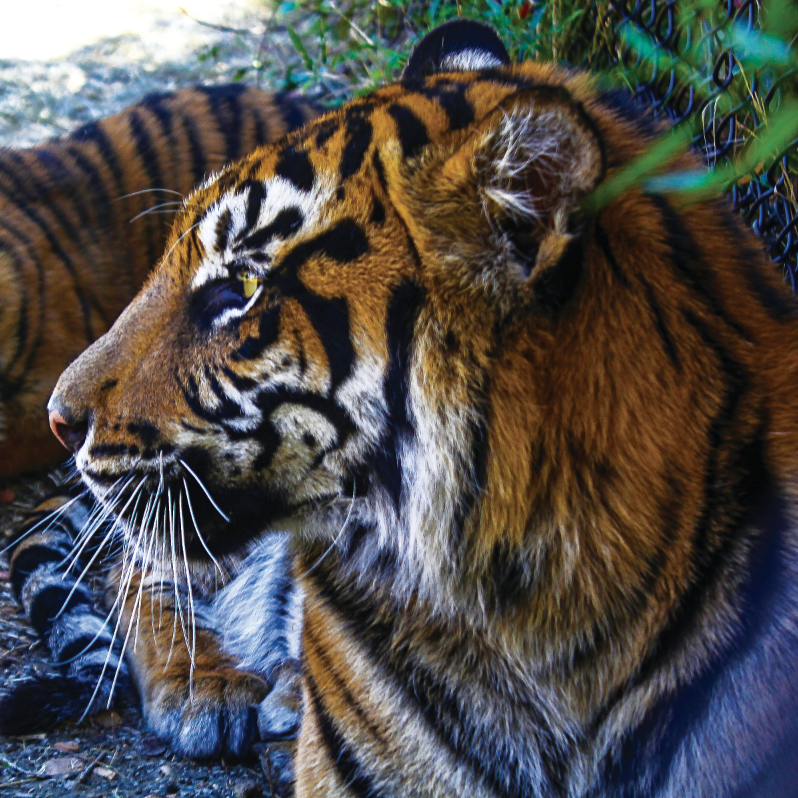Historic zoo partnership supports global conservation
By Jim Ewing
Jackson State University has more than a tiger as a mascot. It has adopted the real deal.
Through a unique partnership sealed in November with the nearby Jackson Zoo, the university pledged $120,000 over three years to not only help raise a rare Sumatran tiger cub but adopt the entire tiger exhibit.
Named Eko, which is Indonesian for “first born,” the male cub is now a year old. The exhibit, renamed the Jackson State University Tiger Exhibit, helps finance care for the growing tiger and his habitat. It also provides refuge for two adult tigers — male Emerson and female Sari. Through the partnership, Jackson State furthermore provides educational kiosks and play areas for children, teaching exercises and special rates for zoo memberships for JSU faculty, staff, students and alumni.
“This partnership between the Jackson Zoo and Jackson State University is an important milestone in the history of both institutions,” said JSU President Carolyn W. Meyers.
“For Jackson State, this is proof positive of our embracing our community here as well as another investment in future leaders for the rest of the 21st century,” she added. “Adopting Eko and his habitat affords cross-disciplinary teams of JSU students the opportunity to design and implement experiences that will ignite the flame of learning.”
Meyers helped plan projects and academic activities for students. One idea that promises to be quite popular is the soon-to-be-installed “Tiger Cam” being coordinated through JSU’s INNOVATE center at Sampson Library and the Mississippi eCenter@JSU.
The zoo’s executive director, Beth Poff, called the partnership an exciting opportunity. “First off, we are neighbors. Secondly, this will benefit the Sumatran tiger breeding program and conservation efforts. And lastly, it will contribute to the well-being of west Jackson.”
Josh Friedel, Jackson Zoo’s director of Major Gifts and Annual Fund, facilitated the partnership. The agreement “establishes an extensive relationship in which both parties will work together to achieve mutually desired long-term goals,” he said.
He added that he was “honored and proud to work with Dr. Meyers and her staff to see this historic agreement come to fruition.”
To promote the partnership, “How Do You Zoo JSU” was held during JSU’s annual Blue and White Tiger Fest on campus April 11.
The zoo brought small animals for petting and offered membership information. Then, on April 25, a communitywide JSU Zoo Day was held at the zoo to officially celebrate the tiger adoption.
The JSU mascot was available for photos; the JSU band performed; and children were treated to face-painting and carousel rides. ONEJSU
Sumatran tigers
Why adoption matters

The adoption of the JSU Tiger Exhibit is monumental for the animals and the community. Sumatran tigers are critically endangered, with fewer than 400 remaining in the wild.
The Sumatran tigers are part of a Species Survival Plan at the Jackson Zoo and are also the main focus for global conservation efforts.
This tiger subspecies is found only on the Indonesian island of Sumatra. Its scientific name is Panthera tigris sumatrae, and adults can reach upward of 300 pounds. Sumatran tigers are the smallest surviving tiger subspecies and are distinguished by heavy black stripes on their orange coats.
They are protected by law in Indonesia, with tough provisions for jail time and steep fines. But despite increased efforts in tiger conservation — including law enforcement and anti-poaching efforts — a substantial market remains in Sumatra and the rest of Asia for tiger parts and products. Sumatran tigers are losing their habitat and prey quickly to deforestation, and poaching shows no sign of decline. Global conservation efforts, therefore, are critical if the Sumatran tigers are to survive.
— Jackson Zoo and the World Wildlife Fund
Welcome Eko and join today
JSU zoo membership
Individuals: $5 per year
Families: $25 per year
Hours: 9 a.m. to 4 p.m. daily (except Christmas)
Location: 2918 West Capitol St. (easily accessible from JSU campus, I-20, I-220, and I-55)
www.jacksonzoo.org/jackson-state-university-3
JSU zoo supporters are encouraged to use the social media hashtag #HowDoUZooJSU.













Leave a Reply